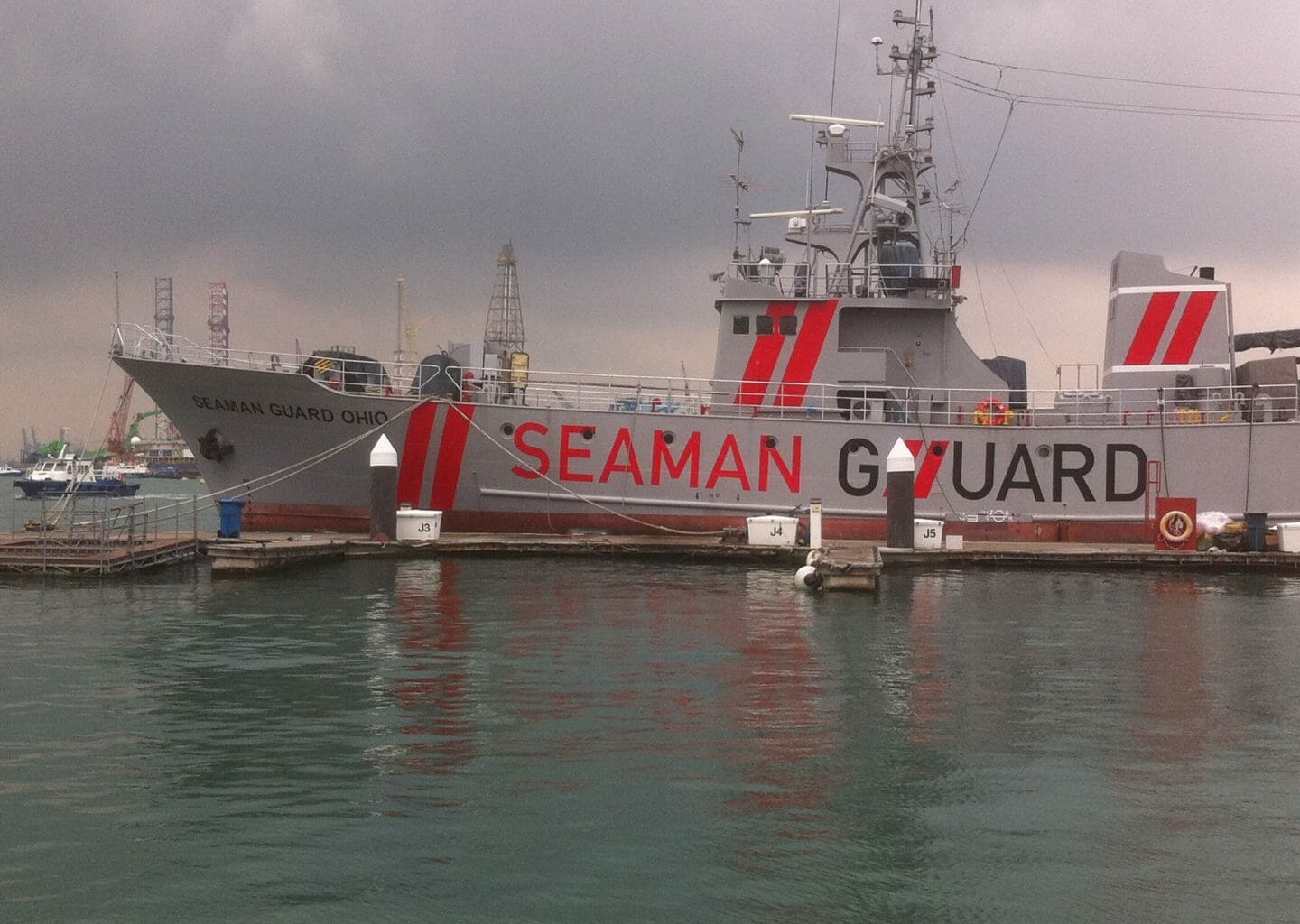The UK Government has failed to keep track of thousands of assault rifles, machine guns and pistols stored on floating armouries, prompting concern they could end up in the hands of terrorists.
Licences have been granted for the export of tens of thousands of guns but The Ferret can reveal there is no central register with details of the weapons, or their serial numbers.
This prompted criticism of the UK Government over a lack of regulation of the private maritime security industry and weapons stored at sea.
Organisations concerned that guns could fall into the hands of criminals include War On Want and the International Association of Maritime Security Professionals who said there should be a UK database with details of the many thousands of British weapons exported.
A report by Omega Research Foundation (ORF) in December 2014 called Floating Armouries: Implications and Risks, said that between April 2012 and September 2013, the UK Government granted licences for the export of 34,377 assault rifles, 5,100 shotguns, 28 machine guns, 2,976 pistols, 12,816 rifles, 1,401 sniper rifles, and 5,294 sporting guns.
The weapons are stored on floating armouries, usually commercially owned ships anchored in international waters, including the Indian Ocean.
Private maritime security companies (PMSCs) protecting ships from pirates in dangerous shipping lanes can store weapons on floating armouries or hire guns from them.
This means that PMSCs can generally operate without fear of legal issues, whereas storing or transporting weapons on land can be problematic due to different nations’ laws regarding weaponry.
Until recently the maritime security industry around the horn of Africa was booming, with UK firms leading anti-piracy operations off the coast of Somalia.
But last July the International Maritime Bureau reported that in the first half of 2015 no vessels had been attacked in the Gulf of Aden or the Red Sea.
The dramatic fall in piracy has prompted fears that some PMSCs could go bankrupt and guns could fall into the hands of terrorists or criminal gangs.
The past four years has seen the number of licensed PMSCs more than halve, according to ESC Global Security, resulting in calls for tighter guidelines to be introduced.
David Stone, president of the International Association of Maritime Security Professionals, said the UK Government should set up a database of all weapons, with serial numbers, so that the original owners can be traced if the guns end up in unauthorised hands.
He added: “There is a risk that companies no longer doing as much business will not be using the weapons they have – resulting in those weapons just lying on the floating armouries. The problem is – and I’ll keep to the British maritime security companies, or PMSCs – there is no general or central data registry of firearms, or use, by British PMSCs, not even by BIS (Business, Innovation and Skills), which is the UK government department for export.”
“There are no checks and balances to make sure that these rifles don’t fall into the wrong hands. There are no checks and balances to ensure these weapons are not rented out to people other than maritime security companies, who don’t have their own weapons. There is obviously a very very large amount of weapons on the floating armouries.”
“The quality of the floating armouries obviously differs between one to the other.”
“There are some very good ones out there and some not so very good ones out there. As for the security of the weapons on board, I personally know that the majority of the floating armouries are well protected. This doesn’t mean to say they couldn’t be blown up by terrorists or taken over by terrorists.”
“As to the weapons being actually transferred from a floating armoury to terrorist or criminal gangs, I don’t see that happening, certainly not with the knowledge I have of the floating armoury owners. I know many of them personally and they are conscientious in their work. But they are only human.”
“As I said, the major problem with weapons being owned by British PMSCs is that right from the start there should have been a central register or database of all weapons, serial numbers, where they were bought, who owns them, where they were bought from, for all British/UK owned PMSCs. This would have save a lot of problems.”
War On Want also called for better UK Government regulation of PMSCs and floating armouries.
The charity’s new report – Mercenaries Unleashed – quoted a ship’s captain who said: “It’s the Wild Wild West out there.”
Vicki Hird, campaigns and policy director at War on Want, said: “For too long this murky world of guns for hire has remained unregulated and unaccountable, stoking instability and conflict on land and at sea.”
“The fact that the government has no idea where these firearms are, and in whose hands they end up, is outrageous and incredibly dangerous. The private military and security industry has long been linked to increasing human rights abuses, a flourishing weapons trade and political destabilisation: the time has come for strict public scrutiny and binding regulation.”
In October 2011, British Prime Minister David Cameron formally authorised the use of private armed guards on board UK-registered ships.
Just under two years later, in August 2013, the UK Department of Business, Innovation and Skills issued 50 licences for floating armouries operating in the Indian Ocean and Gulf of Aden.
But there is no official register of floating armouries and Omega Research Foundation said there is nothing to prevent any vessel being turned into an armoury.
Its 2014 report said that none of the floating armouries it had identified had been purpose-built and they were all adapted craft, adding: “As a result, vessels may not have safe and secure storage for arms and ammunition.”
The report said there was a “worrying lack of regulation regarding the operation and use of floating armouries”.
Omega made a raft of recommendations including calls for the UK government to release details of armouries and companies who use them.
Asked by The Ferret if their recommendations had been acted upon yet, Omega said: “Our concerns remain those outlined in the report.”
Peter Cook, chief executive of the Security Association for the Maritime Industry, said that the UK Government was doing its best in challenging circumstances although he conceded that better regulation was required.
He added: “The area of concern is there is no form of regulation for floating armouries at the moment, therefore there is no monitoring of where these weapons are held, stored and indeed the status of the vessels they are held on, the security of those vessels. Regulation hasn’t caught up yet and those are the main areas of concern.”
“The international community needs to understand the importance of formulating a standard for floating armouries and then drawing it up and implementing it so that we can have weapons being managed in a safe and secure fashion.”
“We are currently conducting a comprehensive survey of floating armouries and the way in which procedures are conducted. We are suggesting that by utilising the existing standards and guidelines for land stations, but in discussions with the organisations in the UN, these can be ‘marinised’ rather than start from scratch.”
“Our report will go to the Marshall Islands who will then submit it to the International Maritime Organisation (IMO) for consideration at the next meeting of the Maritime Safety Committee (MSC) in May this year where the matter will be discussed further.”
A spokesperson for the Department of Business Innovation and Skills said: “The UK Government operates one of the most robust export control regimes in the world. All export licence applications are assessed on a case-by-case basis, against the consolidated EU and national arms export licensing criteria, and we will not issue a licence that does not meet this criteria.”
“This includes where there is a risk of goods being diverted or re-exported under undesirable conditions. There is no evidence that weapons exported from the UK for anti-piracy use are being diverted for other purposes.”
PMSCs based in Scotland include Britannia Maritime Security in Glasgow, but the company declined to comment.
A version of this story was published by Sunday Mail on 6th March 2016.
Cover photo: MV Seaman Guard Ohio Source: cc | Wikipedia














